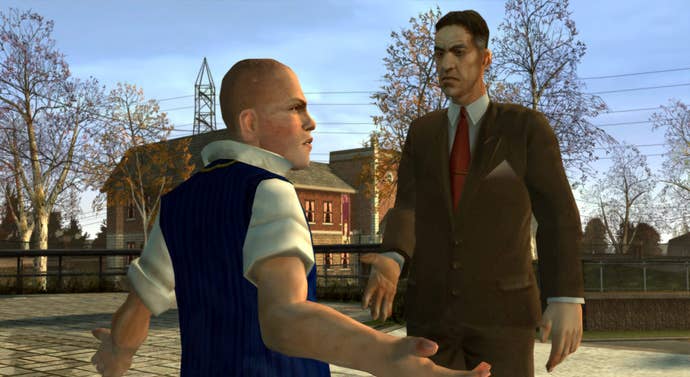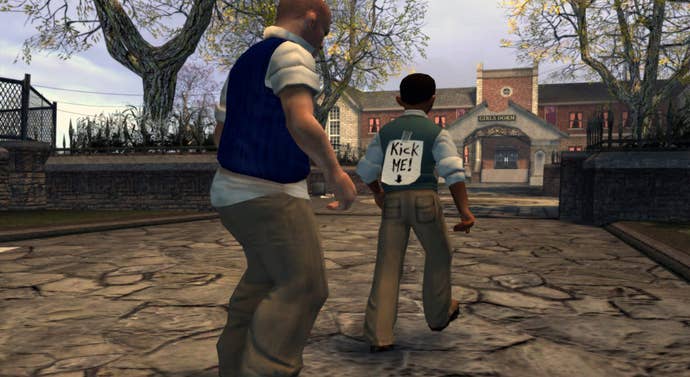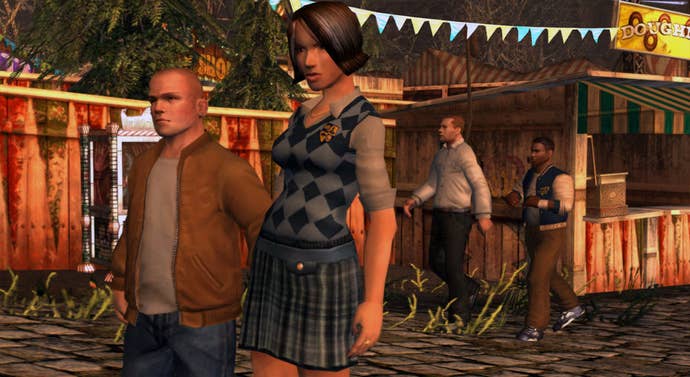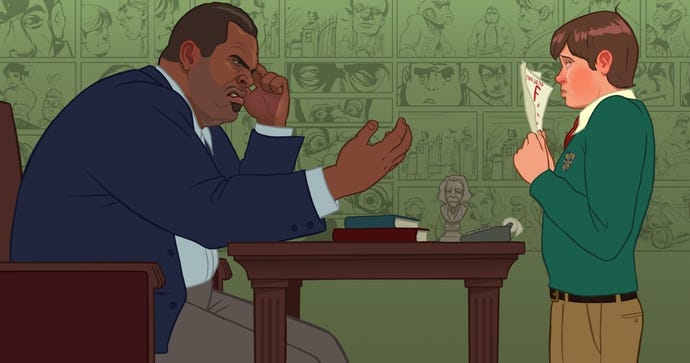Rockstar Files New "Bully" Trademark; Here's Why That's Great
Now that Grand Theft Auto V is on the market, what's next for Rockstar? Potentially a return to Bullworth Academy, that's what. Get out your catapults, light the firecrackers and prepare for the worst wedgie of your life.
This article first appeared on USgamer, a partner publication of VG247. Some content, such as this article, has been migrated to VG247 for posterity after USgamer's closure - but it has not been edited or further vetted by the VG247 team.
Grand Theft Auto may be Rockstar's flagship series, but for my money, the best game the open-world specialists ever put out was Bully.
This is why the prospect of a new Bully game is enormously exciting to me and, with the filing of a new trademark, looks like something that is really going to happen.
The new trademark refers to "Bully Bullworth Academy: Canis Canem Edit." The latter part of the title, Latin for "dog eat dog," was the name given to Bully's original PlayStation 2 release in Europe, though it was later changed back to Bully for the Scholarship Edition ports on Xbox 360, PC and Wii.
We know nothing about the new Bully -- or even if there actually is one as yet -- but it's worth contemplating what made the original game so great, and why a next-generation sequel would be a fantastic idea now that we're living in a post-Grand Theft Auto V world.

Bully originally came out on the PlayStation 2 in 2005, and you'd be forgiven at first glance for believing it a new Grand Theft Auto game starring a teenager; the game ran on a modified Grand Theft Auto: San Andreas engine, featured a protagonist who was initially set up to be something of an anti-hero, and involved relatively freeform open-world gameplay coupled with more structured missions.
However, Bully did some truly interesting things that Grand Theft Auto wasn't able to, and it's all because of its scale. Unlike the Grand Theft Auto series, which has steadily become more and more sprawling over time, with ever-larger maps packed with secrets to explore, Bully deliberately eschewed a huge city setting in favor of a small town, and initially confined all the action to the grounds of Bullworth Academy, the boarding school where protagonist Jimmy Hopkins is sent at the beginning of the game.
Bully's tight focus in these early hours still allowed for a certain degree of freedom, but, practically speaking, only the amount of freedom a teenage boy would have if he was staying in a real boarding school. You were free to cut classes, for example, but only if the prefects didn't catch you. Similarly, you could bully and harass students as you saw fit, but you could also expect to find their friends bearing down on you after long. Eventually, it simply became a more desirable option to keep your head down and start building relationships with the people in the school rather than just punching them in the face all the time -- and with the team's decision to make every person walking around the school a unique character with their own distinctive appearance, name and behavior, that was something you could actually do, unlike Grand Theft Auto's endless parade of nameless pedestrians.

By the time the game opened up and allowed you onto the streets of Bullworth town, you'd recognize pretty much every student from the Academy if you saw them wandering down the streets. Some you'd know to avoid, because they'd chase you and attack you; others you knew you could stop for a chat with, and perhaps a cheeky kiss from your crush. These relationships changed and evolved as the story continued, too; a key narrative theme in the game as a whole was Jimmy bringing together the disparate groups of bullies, jocks, preppies, nerds, greasers and townies against a common foe -- Jimmy's wildly erratic, highly paranoid rival Gary Smith, who becomes increasingly unhinged and desperate as the story goes on.
Bully's story builds to an appropriately dramatic finale that I won't spoil for you here if you're yet to play it, but for the most part keeps things entertainingly low key. Rather than earning money for beating up pedestrians and knocking off stores, you earn it through mowing lawns and winning cycle races. The best vehicle in the game is a low-powered go-kart. And the best weapon in the game is a ball made of rubber bands that you find lying around all over town -- Bully's equivalent of Grand Theft Auto's hidden packages. And all the time, the game makes you constantly aware of your limitations as a teenage boy; Jimmy can't stay up all night, unlike Grand Theft Auto's protagonists, for example, and simply playing truant is considered to be a "crime" on par with punching someone in the face in Grand Theft Auto.
The game ultimately sends a much more positive message than the Grand Theft Auto series, too, in that Jimmy isn't rewarded for causing mischief. In fact, it pays to be a "good boy" and go to classes on time; successfully completing the various minigames that make up each class allows Jimmy to improve his own abilities in practical ways. For example, improving his skill at English improves how effective a communicator he is, allowing him to talk his way out of minor misdemeanors. Chemistry, meanwhile, allows Jimmy to construct more elaborate weapons in his room -- but these are all amusingly low-key and non-lethal items such as stink bombs and firecrackers, too.

That's not the only positive message the game sends. Bully makes no assumptions about Jimmy or the player's sexuality, allowing you to pursue romantic relationships with both male and female characters. That's not all, either; unlike your average teen TV drama, not everyone at the school is represented as a 20something with a perfect body -- indeed, the first person that Jimmy kisses as part of a tutorial on the relationship mechanics is the short, rather overweight Eunice, while other romantic interests include the incredibly tall Christy, brace-wearing nerdy girl Beatrice, closeted bisexual football player Kirby and bisexual bully Trent, none of whom are what you'd call typical romance fodder in video games, particularly those from Rockstar. While none of these relationships are presented in any more depth than "give them enough gifts and they'll kiss you" -- with Jimmy getting the equivalent of "armor" following a successful kiss -- it is at least a positive thing to see both heterosexual and homosexual relationships presented on equal footing and without judgement.
Bully isn't just about being arguably far more socially aware than Rockstar's flagship series, however; it's a great game in its own right. The small-scale setting means that you're likely to see a lot of the detail that has been lovingly crammed into the world, and the game's story missions take you from one end of the map to the other, encouraging you to come back and explore interesting locales later. There's plenty to do, too; besides the story, there's classes to attend, jobs to complete, races to win, hidden objects to find, minigames to play at the fairground and items to buy with which to customize Jimmy. You'll occasionally run into random passers-by who have small, simple missions for you to complete, too, somewhat similar to the "Strangers and Freaks" assignments found in Red Dead Redemption and Grand Theft Auto V.

Bully's a strange case; everyone I know who has played it absolutely loves it, and yet it remains significantly more obscure than Rockstar's other prominent franchises. This may be due in part to the fact that there is only one Bully game compared to the fifteen installments (including DLC and expansions) in the Grand Theft Auto series we've seen to date, but that just leaves it open to be built into a strong, new franchise alongside Rockstar's other well-known properties. Next-gen would be a great fit, too; the small scale of the game's setting would provide Rockstar the opportunity to experiment with the new machines' capacity for open-world gameplay without having to build something as sprawling and ambitious as Grand Theft Auto V's take on San Andreas.
It's high time we returned to Bullworth Academy. The bell is ringing, Rockstar; do try and show up on time.
